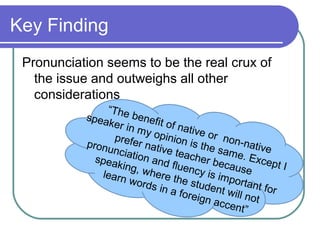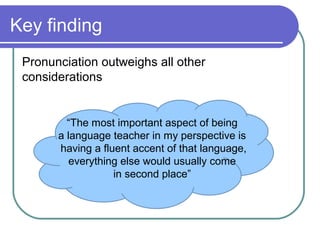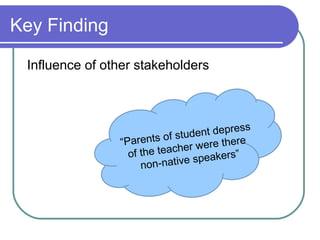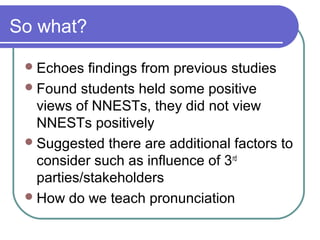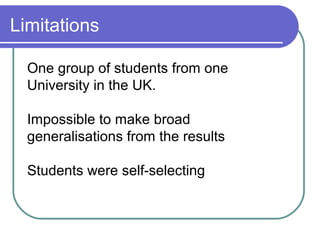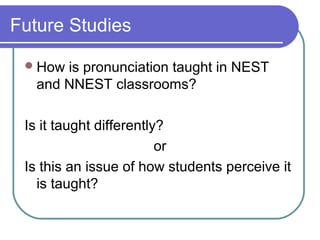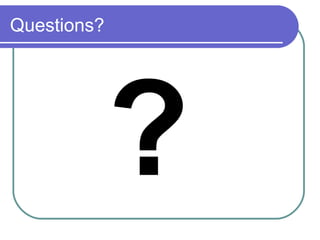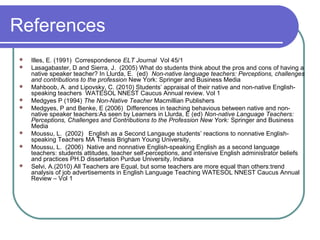NESTs: Do they rule the roost?
- 1. NESTs: Do they rule the roost? International Foundation StudentsŌĆÖ Perceptions on Native and Non-Native English Language Teachers Hazel McAllister Leeds Metropolitan University
- 2. Content ’ü¼ The Question ’ü¼ First Spark ’ü¼ Previous Research ’ü¼ The Study ’ü¼ What Students had to Say (Results) ’ü¼ Discussion ’ü¼ Your questions
- 3. The Question What are the perceptions of UK university foundation students towards NESTs and NNESTs?
- 4. First Spark nts: aker n e ker ded i irem e spe Spea Nee esia Requ ativ ive chers ndon a) N ril/2012 Nat Tea ta, I 12 r 0 8/Ap aka pril/2 J A 10/ Requireme nts: - Native sp eak from UK, Uers Canada, SA, Australia, N Zealand, ew Ireland & S 8/April/201 A 2 ndidakerte: ca r idtealEnglish spea Ou na ive A 012 8/April/2
- 5. First Spark (continued) ’ü¼ Selvi (2010) on two online TEFL jobsites showed over 60% stated nativeness as a job requirement ’ü¼ Illes (1991) Managers are responding to sts demand ’ü¼ Medgyes (1994) Schools use NESTs as a status badge. To recruit more students.
- 6. What is a NEST? Definition is problematic
- 7. Previous Research 1 ’ü¼ Students rate professional skills such as preparation and motivating students as more important than language skills. (Cheung, 2002) ’ü¼ Students would prefer to have both NESTs and NNESTs teaching them (Lasagabaster and Sierra, 2005) ’ü¼ Students recognise that NESTs and NNESTs have different strengths and weaknesses. (MahboobŌĆÖs,2003, cited in Lipovsky and Mahboob, 2010)
- 8. Previous Research 2 NESTs NNESTs ’ü¼ (+) pronunciation ’ü¼ (+) Learning strategy and cultural knowledge of knowledge studentsŌĆÖ L1 ’ü¼ (-) lack of knowledge ’ü¼ (-) pronunciation of the studentsŌĆÖ L1 and teaching ability (Lasagabaster and Sierra, 2005)
- 9. Previous Research 3 ’ü¼ Teaching behaviour is statistically different between the two groups NNEST ŌĆō structured approach to grammar NEST ŌĆō more capable of encouraging speaking Medgyes and Benke (2006)
- 10. The Study ŌĆśSome students think that only native English speakers can be good English language teachers. Others think that non-native English speakers can also be efficient teachers. What is your opinion about this issue? Please feel free to provide personal details and examples.ŌĆÖ Adapted from Mahboob and Lipovsky (2010)
- 11. The Study ’ü¼ Full-timeinternational foundation course students (approx 80 students) Total participants: 8 Male 5 Female 3 IELTS 5+ All had NNESTs &NESTs Arabic and European L1s
- 12. What Students Had to Say ŌĆ£itŌĆÖs b et t er l speak earning w ers b ith na Pronu ecause o tive o nciati f has n onŌĆØ na tive is d only ŌĆ£The ntage an a disadv vantageŌĆØ ad sŌĆØ ssion nt teachin g r expre ŌĆ£m e ore confid ureŌĆØ ŌĆ£riche t about cul
- 13. What Students Had to Say ŌĆ£nativ e t ea exper cher ience have no y [know] in tea ŌĆ£do not reall e ching ŌĆØ a bout th age ything u an h er lang ake tŌĆÖs mot m studen ds which can un r backgro ing easier fo learn stu dentsŌĆØ l ut y to p entŌĆÖs ŌĆ£le ss like to stud in elves sŌĆØ thems shoe
- 14. What Students Had to Say ŌĆ£The more langu y also le e have hingŌĆØ. steps age s o the arne d the - nativ in teac and h y kno ŌĆ£Non ence the s ow to w the i e xper tuden think as o t thin k.ŌĆØ r e als rity a ore e majo any m o ŌĆ£ŌĆ”th e of m ing t aw ar f learn ŌĆ£The best method to improve ues o ŌĆØ non- te chniq speak your Eng lish is to start with can native spe aker because they understan d us/they pass the ŌĆØ same thing like us
- 15. What Students Had to Say e in g it can b ŌĆ£Wh en speak kes with a gram mar mist NNSŌĆØ r ard fo t ŌĆ£Do ŌĆ£It is very h hen i not w o f them cul have some mes t o ture e co bac qual ciationŌĆØ kgr Eng p ronun oun lish d.ŌĆØ
- 16. Key Finding Tendency to have a preference for NEST over NNEST ŌĆ£The non-native can be more efficient in teaching but in my opinion native teachers are always betterŌĆØ
- 17. Key finding Not a homogenous group ŌĆ£The ri matter ght qua a re m o lificatio non-na re impo ns and tive]. If rtant th experie he or s a perso an [bei nce he will n has t ng nati be an e he righ ve or same xcellen t educa probab t native ility of s t teacher wit ion, uccess h and no n-nativ for both the e spea kersŌĆØ
- 18. Key Finding Pronunciation seems to be the real crux of the issue and outweighs all other considerations ŌĆ£The spea bene ker in fit of my o nativ pinio e or prefe n is t non-n pronu r nati he sa ative nciat ve te me. E spea ion a ache xcep king, nd flu r bec tI wher ency ause learn e the is im word s in a stude portant f foreig nt will no or n acc t entŌĆØ
- 19. Key finding Pronunciation outweighs all other considerations ŌĆ£The most important aspect of being a language teacher in my perspective is having a fluent accent of that language, everything else would usually come in second placeŌĆØ
- 20. Key Finding Influence of other stakeholders ss ud ent depre ŌĆ£Pa rents of st ere ch er were th of the tea speakersŌĆØ non-native
- 21. So what? ’ü¼ Echoes findings from previous studies ’ü¼ Found students held some positive views of NNESTs, they did not view NNESTs positively ’ü¼ Suggested there are additional factors to consider such as influence of 3 rd parties/stakeholders ’ü¼ How do we teach pronunciation
- 22. Limitations One group of students from one University in the UK. Impossible to make broad generalisations from the results Students were self-selecting
- 23. Future Studies ’ü¼ How is pronunciation taught in NEST and NNEST classrooms? Is it taught differently? or Is this an issue of how students perceive it is taught?
- 24. Questions? ?
- 25. References ’ü¼ Illes, E. (1991) Correspondence ELT Journal Vol 45/1 ’ü¼ Lasagabaster, D and Sierra, J. (2005) What do students think about the pros and cons of having a native speaker teacher? In Llurda, E. (ed) Non-native language teachers: Perceptions, challenges and contributions to the profession New York: Springer and Business Media ’ü¼ Mahboob, A. and Lipovsky, C. (2010) StudentsŌĆÖ appraisal of their native and non-native English- speaking teachers WATESOL NNEST Caucus Annual review. Vol 1 ’ü¼ Medgyes P (1994) The Non-Native Teacher Macmillian Publishers ’ü¼ Medgyes, P and Benke, E (2006) Differences in teaching behavious between native and non- native speaker teachers:As seen by Learners in Llurda, E (ed) Non-native Language Teachers: Perceptions, Challenges and Contributions to the Profession New York: Springer and Business Media ’ü¼ Moussu, L. (2002) English as a Second Langauge studentsŌĆÖ reactions to nonnative English- speaking Teachers MA Thesis Brigham Young University, ’ü¼ Moussu, L. (2006) Native and nonnative English-speaking English as a second language teachers: students attitudes, teacher self-perceptions, and intensive English administrator beliefs and practices PH.D dissertation Purdue University, Indiana ’ü¼ Selvi, A.(2010) All Teachers are Equal, but some teachers are more equal than others:trend analysis of job advertisements in English Language Teaching WATESOL NNEST Caucus Annual Review ŌĆō Vol 1
Editor's Notes
- #5: According to Illes (1991) managers of such schools claim they are responding to student demand; students, they claim, prefer native English speaking teachers (NEST) (Mahboob, 2003. cited in Fathelbab, 2011) I first became interested last summer, on a discussion board the longest discussion, I was amazed at the direct discrimination teachers faced. It reminded me of the discrimination of the 50s in the UK. I asked a NNEST teacher on her opinions, did she think the different groups had different skills, because at this stage I hadnŌĆÖt really considered it. I also wrote a short blog post on it. And it just gives my opinion. So I was very aware of my own views bias on this, and in part thatŌĆÖs what influenced the methodology I chose.
- #7: intuitive generalisation of perceived differences among peopleŌĆØ (Moussu and Llurda, 2008: the dichotomy is ŌĆ£misleadingŌĆØ when you consider it within the world Englishes framework (Moussu and Llurda, 2008)
- #11: 500-1,000 word essay Why? It allows the participants to highlight the topics that are meaningful to them It makes no presumptions about the kinds of answers participants might provide Minimizes the opportunity for researcher bias I could have opted to do a questionnaire, which in fact is what a lot of other researchers had done. But I was very aware of my bias. And I really wanted some data that I could be as confident as possible was not influenced by my own bias/views and thoughts. I also wanted to know exactly what it is students think and why. I wanted to get behind the headlines of a questionnaires. StudentsŌĆÖ English level, Past exposure to NEST and NNEST Interest in the subject (self-selection) Cultural background Lack of triangulation with semi-structured interviews/ questionnaires Excludes those with low-level English Requires significant input from participants/motivation Snap-shot into the views of this group. The results are not generalisable
- #13: Pronunciation ŌĆō this suggests itŌĆÖs very important to students A total of 92 comments Most comments referred to NEST (51) and 44 of these were positive 37 comments were made about NNESTs, 19 were positive Language ability (42) and pronunciation (16) received the most comments
- #17: Would be interesting to know whether this changes depending on student level There were some exceptions some said they didnŌĆÖt mind and didnŌĆÖt think it was important, but no-one said the NNEST ws preferable to a NEST unless
- #19: Mahboob (2003) who found NNESTs received the greatest criticism for their oral sills. I find this at odds with my personal experience in the classroom when students groan at the idea of a pronunciation lesson This was what nnest were criticised for most and nest praised for most
- #21: All of the comments in the ŌĆ£otherŌĆØ category expressed positive attitudes towards NEST. In this comment the student refers to an external stakeholder parents. The view of parents, who are often the ones who make the decisions about where a student will study, is rarely discussed in the literature. This comments gives us an insight into the views of one on these parents. The second comment seems to suggest that NNEST can teach you, but you must first have a good foundation in the language, which can only be attained through NESTs
- #23: Professional/personal skills play a key role in being a good teacher. (Liang 2002, cited in Ling and Braine 2007; Cheung, 2002,cited in Moussu, 2010).
- #24: Why is this issue of pronunciation so important to them? Is it because they feel the classroom is the only place they can practise it? Do they see it as the most important factor when learning a language? All these things require more research How do students think their pronunciation improves by having a NEST Is it by absorption? Is it by constant correction? Is it by model and drilling
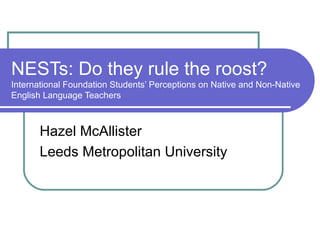
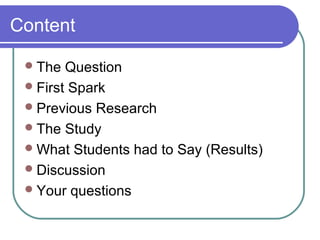
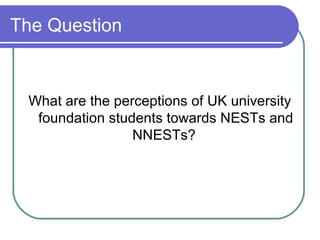

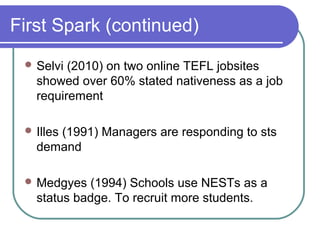
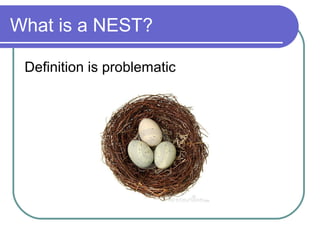
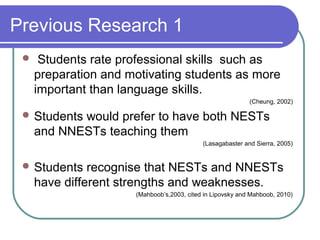
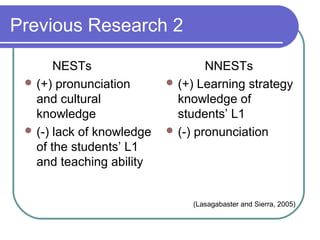
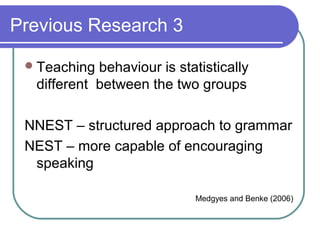
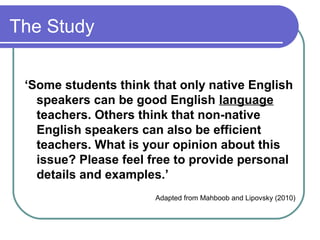

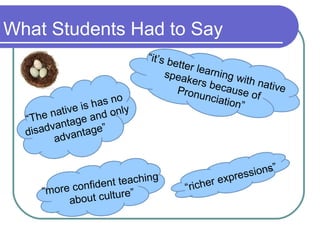
![What Students Had to Say
ŌĆ£nativ
e t ea
exper cher
ience have
no
y [know] in tea
ŌĆ£do not reall e
ching
ŌĆØ
a bout th age
ything u
an h er lang ake
tŌĆÖs mot m
studen ds which can
un r
backgro ing easier fo
learn
stu dentsŌĆØ l
ut
y to p entŌĆÖs
ŌĆ£le ss like to stud
in
elves sŌĆØ
thems shoe](https://image.slidesharecdn.com/warwickpresentation-130125130930-phpapp01/85/NESTs-Do-they-rule-the-roost-13-320.jpg)
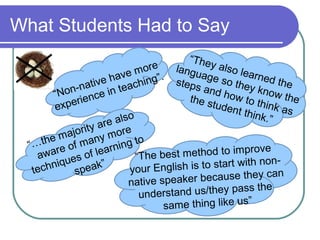
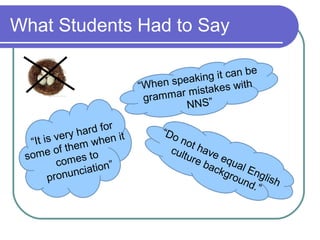
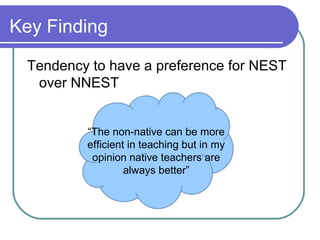
![Key finding
Not a homogenous group
ŌĆ£The ri
matter ght qua
a re m o lificatio
non-na re impo ns and
tive]. If rtant th experie
he or s a perso an [bei nce
he will n has t ng nati
be an e he righ ve or
same xcellen t educa
probab t
native ility of s t teacher wit ion,
uccess h
and no
n-nativ for both the
e spea
kersŌĆØ](https://image.slidesharecdn.com/warwickpresentation-130125130930-phpapp01/85/NESTs-Do-they-rule-the-roost-17-320.jpg)
